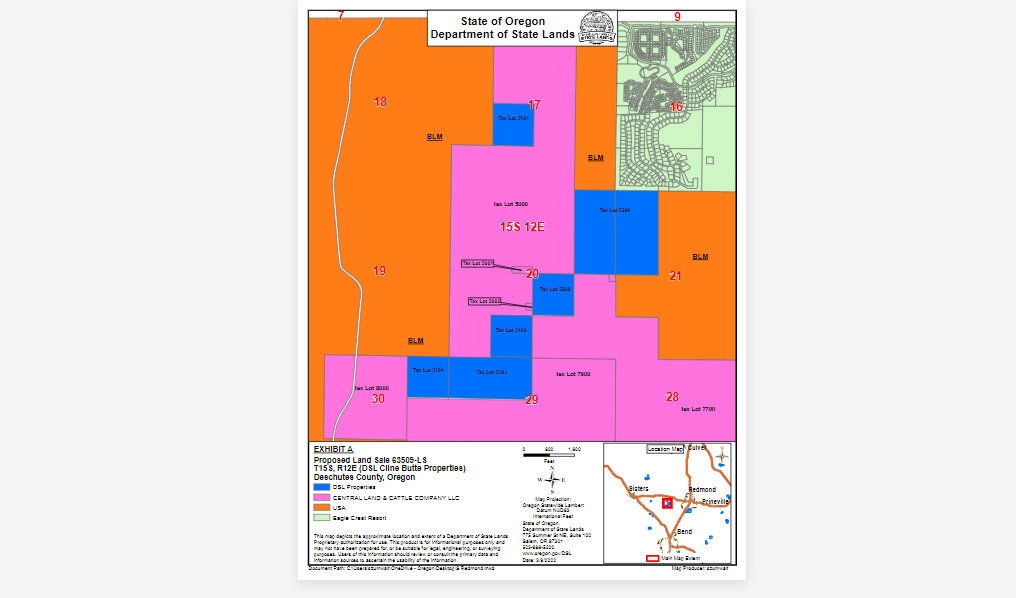Developer of disputed Thornburgh Resort withdraws request to buy 400 acres of state land

(Update: More DSL info on current use of leased land)
Kameron DeLashmutt says he doesn't need to buy land, since he already leases it; foes call move a 'big win'
REDMOND, Ore. (KTVZ) – The developer of the controversial Thornburgh Resort west of Redmond said Monday he has withdrawn a much-criticized request to buy 400 acres of public land held in trust by the state School Fund – because he doesn’t need to, having already leased the property for 17 years.
Department of State Lands Communications Officer Liane O’Neil confirmed that “Central Land and Cattle Company has elected to withdraw their application” for the Cline Buttes Tract, so it has been removed from the August agenda of the State Land Board.
O'Neil said Central Land and Cattle will continue to lease the tract from the department for open space. They have another 10 years remaining for their lease.
"As a tenant, they will need to continue following the terms of the lease agreement, which include only using the tract as open space," O'Neil added. "They may make limited improvements that protect or enhance natural resources or enhance recreation opportunities."
Thornburgh developer Kameron DeLashmutt told NewsChannel 21 the state application was withdrawn Friday, stopping a public process that led to hearings at which numerous speakers voiced opposition to the proposal.
“I don’t need to buy it,” DeLashmutt said Monday. “I’ve had it leased for 17 years. I’ve got an existing agreement with the state.”
In fact, he said, it was basically the state’s idea to buy the land in the first place.
“I went to pursue kind of the next step with the lease, and the state said, ‘Why don’t you just buy it?’” DeLashmutt said. “I said, ‘OK, I guess.”
On this and many avenues of challenge to the Thornburgh plans, first filed in 2005, DeLashmutt claimed, “This is (Central Oregon) LandWatch and other opponents using this (project) as a way to increase their fundraising.”
The appeals have been exhausted on the golf course, which is under construction, and planned lakes as well, he said. They also have tentative plan approval for 300 single-family lots, 37 cabin lots, a golf clubhouse, welcome center and gate house, DeLashmutt said. They also have site plan approval for the first 24 cabins, with some state Land Use Board of Appeal rulings in his favor in recent weeks.
“We will have the final LUBA decision some time in a month on 108 single-family lots, Phase A-2,” he said – though “there are three pending court of appeals cases.”
Nevertheless, DeLashmutt said, “We’ve got plans in for building permits, plan reviews done. We’re getting there.”
So how much has he spent on lawyers in all that time? “It’s a lot – it would knock you out of your seat, actually,” DeLashmutt said. “At the end of the day, we’ll have a fully entitled, fully permitted resort siting in Deschutes County, with incredible views." And he noted, "Our project opponents have spent an awful lot of money, too.”
But he said it’s not just Thornburgh in the crosshairs, calling the controversy “emblematic” of the “weaponization” of Oregon’s land-use laws.
DeLashmutt said foes who claim the project will hurt the groundwater aquifer don’t note that they are leaving plenty of water in the river, some 1.2 million gallons a day. He said they also have “gone through an extensive process to try to reduce our water needs.”
He said they also recently transferred 200 acre-feet of this year’s surface water flows to the North Unit Irrigation District “to give the farmers some drought relief, for no compensation whatsoever.”
As for the future of public access to the land, DeLashmutt said the purchase offer withdrawal keeps the status where it’s been since 2005. He said “the sale of the property would not have allowed anything different to take place without another public process to take place.” When they leased the land, he said, it “was in large part to create income for the school fund. Public access was never discussed.”
He also said Thornburgh gave up mining claims on the land it bought from the BLM “so that the BLM could legally give the land freely to DSL.”
DeLashmutt said the resort “will vastly expand public access and use on the 30,000 acres of public lands all around Cline Buttes that have extensive public access,” also agreeing through the Cline Buttes planning process to spend $350,000 on new trails for that purpose.
"We are hopeful to leverage the Thornburgh funds with other grants and volunteer work to maximize the amount of trails and trailheads that can be constructed for mountain biking/hiking and horseback riding," DeLashmutt wrote. "We recently started construction of a trail across DSL/Thornburgh lands to connect the trail at the northeast side of the DSL land across the ridge to connect to the end of the Stringer trail out to southwest on BLM land that runs north to the Cascade View Trailhead."
Central Oregon LandWatch, meanwhile, called the withdrawal of the proposed land purchase "excellent news for public land and access to Cline Buttes," noting that as of last week, "over 4,500 groups, local businesses and individuals signed a community letter stating their strong opposition to the sale of this public state land for private development."
LandWatch Executive Director Ben Gordon said, “For Cline Buttes and the many people that enjoy this landscape, we are excited to know this area will remain state-owned public land."
"For the scenic and recreational values it provides to all Central Oregonians, we are reassured to know the application has been withdrawn. We also recognize the widespread community effort it took to bring this to fruition. This is a big win for Central Oregon’s livable future.”
DeLashmutt also shared a letter Thornburgh's legal counsel, Janet Neuman -- formerly the director of the Department of State Lands -- sent to the agency about the sale on Friday.
